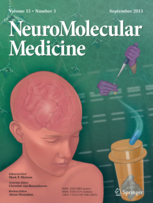Neuromolecular Medicine
Neuromolecular Medicine is a branch of medicine and neuroscience that seeks to understand the molecular basis of neural disorders and to develop molecular interventions to treat them. This field combines principles from molecular biology, genetics, neuroscience, and pharmacology to explore the complex interactions between neural systems, genes, and molecular pathways that influence neural function and behavior. Neuromolecular medicine aims to translate this understanding into targeted therapies for neurological disorders and psychiatric disorders, offering hope for conditions that are difficult to treat with traditional approaches.
Overview[edit | edit source]
Neuromolecular medicine focuses on the molecular and cellular mechanisms that underlie the development, functioning, and malfunctioning of the nervous system. It involves the study of how genes and their products (proteins and non-coding RNAs) interact within neural cells and networks to maintain neural health, how alterations in these interactions can lead to disease, and how these pathways can be modulated for therapeutic benefit.
Key Areas of Research[edit | edit source]
Research in neuromolecular medicine covers a wide range of topics, including but not limited to:
- The role of genetic mutations and variations in neural disorders.
- The study of neurotransmitters, receptors, and other molecules involved in neural signaling and their relation to disease.
- The development of molecular diagnostics for early detection and monitoring of neural disorders.
- The creation of gene therapy, stem cell therapy, and molecular pharmacology strategies to treat or manage neurological and psychiatric conditions.
Challenges and Future Directions[edit | edit source]
One of the major challenges in neuromolecular medicine is the complexity of the nervous system and the diseases that affect it. Many neural disorders are caused by a combination of genetic, environmental, and lifestyle factors, making them difficult to study and treat. Furthermore, the brain's protective barrier, the blood-brain barrier, poses a significant obstacle to delivering therapies directly to the site of disease.
Future directions in neuromolecular medicine include the development of more sophisticated models of neural disorders, including induced pluripotent stem cells (iPSCs) and organoids that can mimic disease processes in vitro. Additionally, advances in CRISPR-Cas9 and other gene-editing technologies offer the potential for correcting genetic mutations at their source. The integration of artificial intelligence and machine learning into research and diagnostics is also expected to accelerate the discovery of new therapeutic targets and the development of personalized medicine approaches.
Conclusion[edit | edit source]
Neuromolecular medicine represents a promising frontier in the fight against neural disorders. By unraveling the molecular complexities of the nervous system, researchers and clinicians are working towards developing more effective and targeted treatments. As our understanding of the molecular underpinnings of neural function and dysfunction grows, so too does our potential to improve the lives of individuals affected by neurological and psychiatric disorders.
Search WikiMD
Ad.Tired of being Overweight? Try W8MD's physician weight loss program.
Semaglutide (Ozempic / Wegovy and Tirzepatide (Mounjaro / Zepbound) available.
Advertise on WikiMD
|
WikiMD's Wellness Encyclopedia |
| Let Food Be Thy Medicine Medicine Thy Food - Hippocrates |
Translate this page: - East Asian
中文,
日本,
한국어,
South Asian
हिन्दी,
தமிழ்,
తెలుగు,
Urdu,
ಕನ್ನಡ,
Southeast Asian
Indonesian,
Vietnamese,
Thai,
မြန်မာဘာသာ,
বাংলা
European
español,
Deutsch,
français,
Greek,
português do Brasil,
polski,
română,
русский,
Nederlands,
norsk,
svenska,
suomi,
Italian
Middle Eastern & African
عربى,
Turkish,
Persian,
Hebrew,
Afrikaans,
isiZulu,
Kiswahili,
Other
Bulgarian,
Hungarian,
Czech,
Swedish,
മലയാളം,
मराठी,
ਪੰਜਾਬੀ,
ગુજરાતી,
Portuguese,
Ukrainian
Medical Disclaimer: WikiMD is not a substitute for professional medical advice. The information on WikiMD is provided as an information resource only, may be incorrect, outdated or misleading, and is not to be used or relied on for any diagnostic or treatment purposes. Please consult your health care provider before making any healthcare decisions or for guidance about a specific medical condition. WikiMD expressly disclaims responsibility, and shall have no liability, for any damages, loss, injury, or liability whatsoever suffered as a result of your reliance on the information contained in this site. By visiting this site you agree to the foregoing terms and conditions, which may from time to time be changed or supplemented by WikiMD. If you do not agree to the foregoing terms and conditions, you should not enter or use this site. See full disclaimer.
Credits:Most images are courtesy of Wikimedia commons, and templates, categories Wikipedia, licensed under CC BY SA or similar.
Contributors: Prab R. Tumpati, MD

